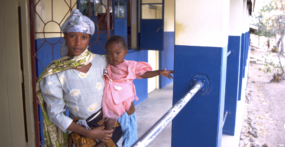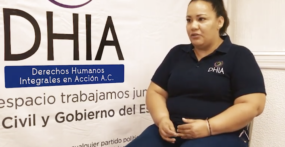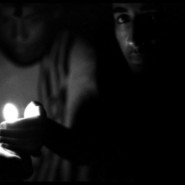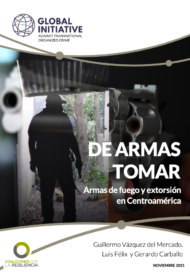Posted on 09 Oct 2019
Casa Refugio is a shelter in an old neighbourhood of Mexico City, set among avenues named after cities. It is home to one of the memorials dedicated to Mexican journalist Javier Valdez, who was murdered in Culiacán, Sinaloa, in 2017. The shelter was created by the Mexico City authorities in 1998 as a haven of safety for writers who are persecuted for their ideology or work.
It was there that I met Griselda Triana, herself a journalist who has had to take refuge in the Mexican capital after her husband was murdered. I visited her to talk about her own personal resilience and that of other families who have fled their homes out of fear. In the last year alone, 12 journalists have been killed in Mexico and there have been more than 150 cases since 2000. In addition, there have been countless other instances of threats, intimidation and kidnappings. And the overwhelming majority of cases remain unsolved. Despite the army presence on the streets, Mexico has become the most dangerous country in the world for journalists. The main threats come from organized criminals and from the authorities themselves, who are often in cahoots with them.

Griselda is still dealing with the consequences of that terrible day. She lives in an environment of surveillance – which is a double-edged sword. She has protection from the state (in the form of a bodyguard), but was also reportedly spied upon by the previous government, and has not been able to sleep properly for two years. She feels great pain for all that her children have lost and for their unsettled lives. But she still manages to smile, and to dream. She speaks frankly of her experiences in therapy and the challenges of understanding herself as victim, while continuing her quest for justice.
Since her husband was murdered, Griselda has publicly led a coalition of civil-society actors who are pursuing his case with the federal authorities. She has also vigorously defended the freedom of the press and has continued talking about the topics that Valdez wrote about: disappearances, human rights and violence. And she still finds time to talk to other victims, despite her own fatigue and pain.

Griselda is a grantee of the Resilience Fund Against Transnational Organized Crime, which supports investigative journalists, anti-crime activists and community-based organizations around the world.
‘I ask you to try to imagine what happens after learning that the person with whom you shared a life and many years was killed for exercising his freedom of speech. Imagine how difficult it is to continue with a life that will never be the same again, when you are aware that this crime will go unpunished, that there will be no justice.’Thus began Griselda as she told her story in Vienna during the launch of the Resilience Fund in May 2019.
Griselda knows that she is resilient – a quality, for her, that is both deeply personal, but which she is forging into something more tangible, empowering and replicable through her activism. She is uncomfortable when someone tells her that she is an inspiration, however. And while she is aware that she is a victim – like other relatives of murdered journalists in Mexico – she does not want to be defined as one, or as the widow of one. She just wants justice for Javier – and for all the journalists and activists in Mexico who have been killed.

She is keenly aware of the importance of resilience in the face of adversity, and not only because of the courses she takes and her reading on the subject, to which she applies herself with passion. But she also wants to share what she continues to learn every day about the need for resilience – she already does it with her children, and her desire is to work with families who have gone through the same ordeal as her.
The project she is now developing with the support of the Resilience Fund allows Griselda to approach the families of murdered journalists and learn about their survival stories, hear about the obstacles and the challenges they have had to face. Her focus is on resilience, on finding what has made the victims’ families stronger, on joining their voices together to seek, if not all the answers, then at least respect for their rights and the reparations they deserve.
Her project is strengthened through the support of Balbina Flores, the correspondent and representative of Reporters Without Borders in Mexico, and Claudia Corona, professor at the National Autonomous University of Mexico, women who for more than a decade have been monitoring cases of attacks against the media.

The trio have participated in the design of
the project. Griselda’s involvement goes beyond her role as a wife, mother and
victim. She is also a communications professional, and before leaving her home town,
she was the head of the radio programme produced by the gender policy
department at the Autonomous University of Sinaloa. Balbina brings her
experience as a social worker and journalist who has travelled to Mexico’s most
criminally dangerous places, interviewing relatives of assassinated or threatened
journalists. Claudia joined the team to work on data-collection methods, with
experience as a university researcher on human rights and freedom of expression
issues.
Seeing the three work together, bringing
their different perspectives and skills, is inspiring – women asking themselves
life-and-death questions, sharing stories of a terrible reality among other
stories of hope. Sitting in a sunlit room, they laugh and get excited between silences,
when talking about the tragic realities of those they will soon interview. A
passing cloud momentarily casts the room in shadow, and suddenly they all fall silent.
They know that the light, the laughter they can find in this place of shelter
are ephemeral. But the silence does not last long and the room lights up again.
#NoAlSilencio (#NoMoreSilence) has been the
rallying call that Griselda Triana has chanted in the streets during protest
marches. Her resolve seems limitless. And, that afternoon, her enthusiasm
motivates us to go and put an end to the darkness engulfing those who still cannot
find peace, shelter or justice.



